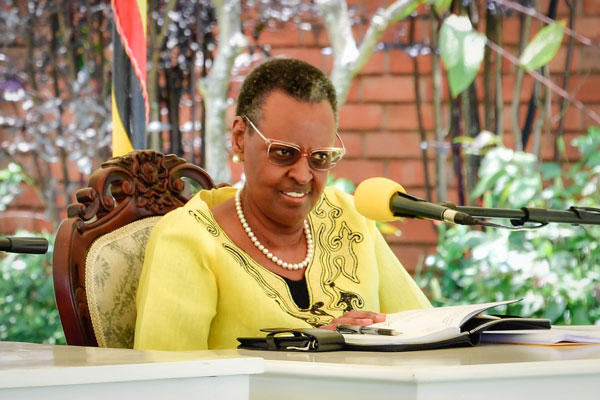
Kampala, Uganda | THE INDEPENDENT | The First Lady and Minister of Education and Sports, Janet Kataha Museveni, has expressed her disapproval of the promotion and distribution of reusable sanitary pads to schoolgirls in the country. In her statement, she recognized the urgent necessity for girls to have access to menstrual hygiene products.
However, she asserted that the idea of reusable pads is also degrading and raises health concerns.
She made the remarks during the National Youth Convention on Friday. She mentioned that a group of people had approached her recently with the idea of promoting reusable sanitary pads as a means to keep girls in school, but she firmly declined to be part of such a campaign.
Janet Museveni was visibly discontented with the name of these pads, as they were branded “Africa Pad,” possibly referring to AfriPad the largest, certified producer of reusable pads in Uganda. She expressed her dismay, questioning why it was necessary for African girls to resort to reused sanitary pads in this modern era.
Hope Nankunda, the Executive Director of Health Promotions and Rights Watch Uganda, acknowledges the aspirations of girls to menstruate with dignity. She agrees with the First Lady’s emphasis on the importance of ensuring that girls have the best available means to manage their periods, such as disposable sanitary towels.
However, Nankunda points out that before dismissing the idea of reusable sanitary pads, it’s crucial to consider the dire circumstances in poor rural families where even affording a meal can be a struggle, let alone a sanitary pad. “In these impoverished areas, sanitary pads are often perceived as a luxury item. To such families, a reusable pad can be a practical and valuable resource,” she adds.
Nankunda goes on to explain that, even without reusable pads, girls in these situations still menstruate, and one might wonder how they manage. Many resort to using old clothes, which they wash and reuse, but a proven, safer option like reusable sanitary towels could be a significantly better solution if made available to them. Her perspective highlights the need for considering the economic realities and practicalities faced by girls and their families in disadvantaged regions, where alternative solutions like reusable sanitary pads may offer a lifeline to maintaining dignity and health during menstruation.
During the event, the First Lady maintained the perspective that the provision of sanitary pads should primarily be the responsibility of parents. However, she believes that the government should play a vital role in supporting families to develop sustainable livelihoods that can enable them to provide for their children, as alternative interventions have proven to be ineffective.
First Lady and Minister of @Educ_SportsUg presides over the 6th National Youth Convention ongoing at Kololo Ceremonial Grounds. #6NYC23@InfoUclf @UgYouthForum @UgandaMediaCent @StateHouseUg pic.twitter.com/LLUtO1XsRL
— Kyobe Sarah. N (@kyobesarah) October 13, 2023
This has been her long-standing argument, exemplified in her statements over the years. For instance, in 2020, during a televised broadcast on a Saturday afternoon, while reviewing the progress of implementing the NRM manifesto in alignment with the education sector, janet Museveni emphasized that if the government were to assume the responsibility of parents, it should do so in a sustainable manner through a well-funded national project.
Furthermore, she proposed the idea of establishing a factory dedicated to manufacturing sanitary pads that could be distributed at no cost to all schoolgirls across the country, presenting a vision for a self-sustaining solution to the pressing issue of menstrual hygiene among young girls.
The provision of sanitary pads to girls has remained a prominent and pressing issue in Uganda for over a decade. Research has established a critical link between girls’ school dropout rates and the challenges they face during menstruation. Many girls, lacking access to sanitary towels, skip school due to the fear of embarrassment and discomfort.
In a significant 2012 study conducted by the International Rescue Centre, it was revealed that one in ten menstruating girls misses school for four days every month, adding up to a total of approximately 24 days per year. Menstrual hygiene activists have been relentless in their efforts to advocate for the government to provide free sanitary towels to all girls, much like the government’s distribution of free condoms to promote safe sex.
In the lead-up to the 2016 presidential campaigns, President Yoweri Museveni, who was seeking and eventually won his fifth presidential term, made a pledge to provide free sanitary pads to students, among other promises, if he was reelected to office.
“I want all our daughters to attend school and remain there until they complete their studies. One of the reasons that force our daughters out of school, is that when their periods start, they do not have sanitary pads. When they are in class, they soil their dresses. So they run away from school,” the president said and it was anticipated that this promise would materialize in the fiscal year 2017/18 but it has not materialized to date.
****
URN
 The Independent Uganda: You get the Truth we Pay the Price
The Independent Uganda: You get the Truth we Pay the Price


